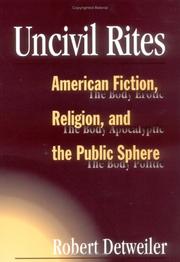| Listing 1 - 9 of 9 |
Sort by
|

ISBN: 0571175112 9780571175116 Year: 1995 Publisher: London Faber & Faber
Abstract | Keywords | Export | Availability | Bookmark
 Loading...
Loading...Choose an application
- Reference Manager
- EndNote
- RefWorks (Direct export to RefWorks)
Book
ISBN: 9782355840869 Year: 2011 Publisher: Paris : Sonatine,
Abstract | Keywords | Export | Availability | Bookmark
 Loading...
Loading...Choose an application
- Reference Manager
- EndNote
- RefWorks (Direct export to RefWorks)
Coppola, Eleanor --- Apocalypse now (film) --- Cinéma --- Journaux intimes --- Production et réalisation --- Philippines --- 1970-.... --- Récits personnels
Book
ISBN: 9782917817483 2917817488 Year: 2016 Publisher: Lille: La Contre allée,
Abstract | Keywords | Export | Availability | Bookmark
 Loading...
Loading...Choose an application
- Reference Manager
- EndNote
- RefWorks (Direct export to RefWorks)
Et si nous allions au cinéma en compagnie de Machiavel ? Si Pablo Iglesias est désigné comme le porte-parole de Podemos, ce professeur de sciences politiques est avant tout l'un des penseurs et fondateurs de ce parti antilibéral. Machiavel face au grand écran se présente comme la somme de ses cours de Cinéma politique à l'université Complutense de Madrid entre 2006 et 2010. Sa lecture de la représentation du pouvoir au cinéma nous permet de mieux connaître la pensée d'un homme qui bouscule la scène politique internationale et pour qui le 7ème art ne relève pas seulement du divertissement intellectuel mais permet aussi de parler de politique telle que l'entendait Machiavel, c'est-à-dire comme la science du pouvoir. En analysant des films tels que Apocalypse now, La Bataille d'Alger, Dogville... Pablo Iglesias aborde les thématiques de la violence politique, la mémoire historique, la nation, le colonialisme, la post-modernité capitaliste en Amérique latine, le genre et le féminisme. Figure historique " maudite ", Machiavel reste aujourd'hui une référence - que d'aucuns pourraient considérer dangereuse - pour ceux qui veulent comprendre et pratiquer la politique. Pablo Iglesias Turrión tient ici à faire entendre que la politique ne concerne pas que " les politiques " et ne se limite pas à la recherche du consensus.
Motion pictures --- Cinéma --- Political aspects --- History --- Aspects politiques --- Histoire --- Apocalypse now (Motion picture) --- Dogville (Motion picture) --- Lolita (Motion picture) --- Amores perros (Motion picture) --- La battaglia di Algeri (Motion picture) --- Cinéma --- History.
Book
ISBN: 9782368904893 2368904891 Year: 2015 Publisher: Paris: Le Passeur,
Abstract | Keywords | Export | Availability | Bookmark
 Loading...
Loading...Choose an application
- Reference Manager
- EndNote
- RefWorks (Direct export to RefWorks)
destin --- Jedi --- karma --- la côte obscur de la force --- le mal --- manichéisme --- la guerre --- Apocalypse Now --- mourir --- rester zen --- la liberté --- régime politique --- servitude volontaire --- manque de foi --- la force --- religion --- magie --- sorcellerie --- philosophie

ISBN: 0899506275 Year: 1991 Publisher: Jefferson, N.C. London McFarland
Abstract | Keywords | Export | Availability | Bookmark
 Loading...
Loading...Choose an application
- Reference Manager
- EndNote
- RefWorks (Direct export to RefWorks)
All that jazz (Motion picture) --- American graffiti (Motion picture) --- Annie Hall (Motion picture) --- Apocalypse now (Motion picture) --- Bananas (Motion picture) --- Breaking away (Motion picture) --- Carrie (Motion picture) --- Escape from Alcatraz (Motion picture) --- Jaws (Cinéma) --- Jaws (Film) --- Jaws (Motion picture) --- M*A*S*H (Motion picture) --- McCabe & Mrs. Miller (Motion picture) --- McCabe and Mrs. Miller (Motion picture) --- Raiders of the lost ark (Motion picture) --- Taxi driver (Motion picture) --- Motion pictures --- Motion picture industry --- Cinéma --- Industrie --- Cinéma --- United States --- History --- 20th century

ISBN: 0252065808 0252019326 Year: 1996 Volume: *2 Publisher: Urbana ; Chicago University of Illinois Press
Abstract | Keywords | Export | Availability | Bookmark
 Loading...
Loading...Choose an application
- Reference Manager
- EndNote
- RefWorks (Direct export to RefWorks)
Apocalypse now (Motion picture) --- Godsdienst in de literatuur --- Miller, Arthur, 1915-2005. The Crucible --- Religion dans la littérature --- Religion in literature --- American fiction --- 20th century --- History and criticism --- Fiction --- Religious aspects --- United States --- Religion --- Religious fiction [American ] --- Doctorow, Edgar Laurence --- Coover, Robert Lowell --- Gordon, Mary Catherine --- Caputo, Philip --- Erdrich, Louise --- Pielmeier, John --- Hansen, Ron --- Dewberry, Elizabeth --- Morrison, Toni --- ROMAN AMERICAIN --- ROMAN RELIGIEUX AMERICAIN --- ETATS-UNIS --- ROMAN --- RELIGION DANS LA LITTERATURE --- 20E SIECLE --- HISTOIRE ET CRITIQUE --- RELIGION --- ASPECT RELIGIEUX
Book
ISBN: 9782910196745 Year: 2008 Publisher: S.L. Camion Noir
Abstract | Keywords | Export | Availability | Bookmark
 Loading...
Loading...Choose an application
- Reference Manager
- EndNote
- RefWorks (Direct export to RefWorks)
les Ecritures sataniques --- la Bible satanique --- Peter H. Gilmore --- l'Eglise de Satan --- la Grande magie --- le mage Gilmore --- les principes du rituel satanique --- cérémonies profanes --- la Hiérarchie infernale de l'Eglise de Satan --- Dieu --- Diable --- Satanisme --- religion --- aliénation --- Apocalypse Now --- 11 septembre --- West Memphis --- Columbine --- fascisme --- eugénisme --- la famille --- le mariage homosexuel --- esthétique sataniste --- Diabolus In Musica --- adoration --- Anton Szandor LaVey --- Prince des Ténèbres --- justice --- hiérarchie naturelle --- la communauté satanique --- rituels --- Ragnarök
Book
ISBN: 9780520966543 0520966546 9780520282322 0520282329 9780520282339 0520282337 Year: 2017 Publisher: Oakland, California
Abstract | Keywords | Export | Availability | Bookmark
 Loading...
Loading...Choose an application
- Reference Manager
- EndNote
- RefWorks (Direct export to RefWorks)
In Hymns for the Fallen, Todd Decker listens closely to forty years of Hollywood combat films produced after Vietnam. Ever a noisy genre, post-Vietnam war films have deployed music and sound to place the audience in the midst of battle and to provoke reflection on the experience of combat. Considering landmark movies-such as Apocalypse Now, Saving Private Ryan, The Thin Red Line, Black Hawk Down, The Hurt Locker, and American Sniper-as well as lesser-known films, Decker shows how the domain of sound, an experientially rich and culturally resonant aspect of cinema, not only invokes the realities of war, but also shapes the American audience's engagement with soldiers and veterans as flesh-and-blood representatives of the nation. Hymns for the Fallen explores all three elements of film sound-dialogue, sound effects, music-and considers how expressive and formal choices in the soundtrack have turned the serious war film into a patriotic ritual enacted in the commercial space of the cinema.
Film soundtracks --- Motion picture music --- War films --- Motion picture soundtracks --- Movie soundtracks --- Soundtracks, Film --- Soundtracks, Motion picture --- Soundtracks, Movie --- Sound recordings --- History and criticism. --- War films History and criticism --- History and criticism --- american film. --- american sniper. --- apocalypse now. --- battle. --- black hawk down. --- cinema studies. --- cinema. --- combat films. --- combat training. --- combat. --- dialogue. --- film analysis. --- film music. --- film soundtrack. --- film studies. --- films about war. --- hollywood. --- hurt locker. --- movies about war. --- patriotic. --- saving private ryan. --- soldiers. --- sound effects. --- thin red line. --- veterans. --- vietnam war films. --- vietnam war movies. --- vietnam war. --- vietnam. --- war films. --- war movies. --- wartime.
Book
ISBN: 9780674660342 067466034X 9780674969889 067496988X 9780674969865 0674969863 0674979842 Year: 2016 Publisher: Cambridge, MA
Abstract | Keywords | Export | Availability | Bookmark
 Loading...
Loading...Choose an application
- Reference Manager
- EndNote
- RefWorks (Direct export to RefWorks)
Nothing Ever Dies, Viet Thanh Nguyen writes. All wars are fought twice, the first time on the battlefield, the second time in memory. From the author of the bestselling novel The Sympathizer comes a searching exploration of a conflict that lives on in the collective memory of both the Americans and the Vietnamese.
Vietnam War, 1961-1975 --- Memory --- War and society. --- Art and war. --- Identity (Psychology) in art. --- War and art --- Art and history --- Art and state --- Society and war --- War --- Sociology --- Civilians in war --- Sociology, Military --- Sociology of memory --- Vietnam Conflict, 1961-1975 --- Vietnamese Conflict, 1961-1975 --- Vietnamese War, 1961-1975 --- Social aspects. --- Art and the war. --- Sociological aspects. --- Social aspects --- Vietnam War (1961-1975) --- Kollektives Gedächtnis. --- Vietnamkrieg. --- Vietnam War (1961-1975). --- 1961-1975. --- War and society --- Art and war --- Identity (Psychology) in art --- Art and the war --- Sociological aspects --- apocalypse now. --- asian american writers. --- cambodian genocide. --- cold war. --- communism. --- ethics memory. --- historical amnesia. --- hmong people. --- ho chi minh. --- immigrants. --- khmer rouge. --- korean war. --- laos. --- national identity. --- patriotism. --- racism. --- refugees. --- things they carried. --- viet cong. --- vietnam veterans memorial. --- war literature.
| Listing 1 - 9 of 9 |
Sort by
|

 Search
Search Feedback
Feedback About UniCat
About UniCat  Help
Help News
News